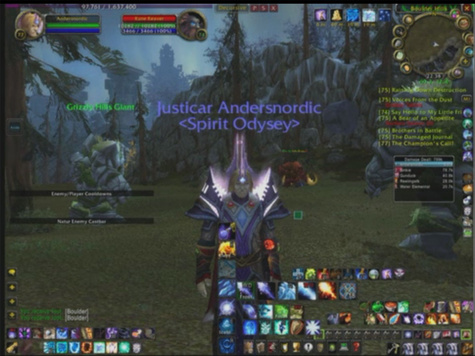 On July 22, 2011, Anders Behrig Breivik killed 77 people in a horrific tragedy in Norway. Within a day, game-centric journalism sites and blogs began covering stories about the killer because Breivik wrote a 1500 page manifesto that included recommendations on using Call of Duty: Modern Warfare 2 as training for an inevitable war with Islam. He also discussed using an obsession with World of Warcraft as a cover – saying you couldn’t answer your phone because “you were busy raiding” isn’t likely to invite any questions. “If you’re planning requires you to travel, say that you are visiting one of your WoW friends,” Breivik writes, “or better yet, a girl from your ‘guild’ (who lives in another country). No further questions will be raised if you present these arguments.”
On July 22, 2011, Anders Behrig Breivik killed 77 people in a horrific tragedy in Norway. Within a day, game-centric journalism sites and blogs began covering stories about the killer because Breivik wrote a 1500 page manifesto that included recommendations on using Call of Duty: Modern Warfare 2 as training for an inevitable war with Islam. He also discussed using an obsession with World of Warcraft as a cover – saying you couldn’t answer your phone because “you were busy raiding” isn’t likely to invite any questions. “If you’re planning requires you to travel, say that you are visiting one of your WoW friends,” Breivik writes, “or better yet, a girl from your ‘guild’ (who lives in another country). No further questions will be raised if you present these arguments.”
Violent events have been linked to videogames countless times in the mainstream media, usually to the dismay of gaming journalists. While some have strong connections, such as Breivik explicitly saying he used Modern Warfare 2 to train, others have much more tenuous connections, like when the Denver Post claimed the Columbine school shooting was caused by parents revoking the shooters’ videogame rights.
When video games are blamed for such events as a 19-year-old burning down a synagogue because he was “taken over by these games that young people play now — lots of violence, lots of meanness,” it is natural for people who love videogames to want to respond, especially those who write about games for a living. But maybe they shouldn’t respond at all.
The more videogame outlets that report on Breivik’s World of Warcraft character, or Mark Bradford throttling a boy who killed his character in Call of Duty, the more prevalent the idea will be that videogaming is related to violence. The more loudly the gaming community denies that there is a connection, the more inculcated that connection becomes in the media at large, and the wider the story grows.
Further, most videogame journalism isn’t reporting on violent events themselves, but rather, responding (often defensively) to mainstream media coverage finding a link between violence and videogames. This makes the community seem self-protective and downright angry to most outsiders. Some would even argue that it’s simply beyond the pervue of videogame journalism to report these incidents and that journalists should concentrate on predicting Gabe Newell’s next move, not analyzing crime.
On the other hand, gaming outlets are more able to address these stories – writers who cover videogames actually understand what it means to be a “Justicar” in World of Warcraft, as well as what light that may shed on Breviek’s personality. And a reporter who has actually been in a WoW guild can certainly explain Breviek’s guild-mates reactions on a forum with more nuance than a reporter who’s never picked up the game in the first place.
So what’s videogame journalism supposed to do? I’m including this post as part of the problem and not naming names elsewhere (because you know who you are). Should we not say anything and simply concentrate on whether a new game is good or not? Or is gaming journalism’s only recourse to react to what is seen as an increasingly hostile mainstream media? Is the best defense saying nothing at all?
Niche journalism, while often lacking a wider perspective, does bring something unique to the great sea of media we all consume everyday – insider perspective. With expertise comes responsibility, including the burden of representing entire communities, whether intentionally or not.
